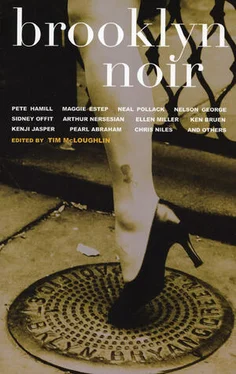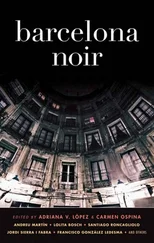But she found it easy to go light on him. Rosa felt bad for him because she realized he was up against being born and raised on the rough streets of Bushwick, and the ghetto was stronger than any emotion Rosa could muster. The darkness of these streets couldn’t be cracked by sunlight or love. But Rosa believed that she would get him out of this and they could start a new life.
Now the whole script was flipped. She was being pulled into his world. A world her parents had invested a lifetime of savings to keep her out of.
His left arm was hanging around her shoulders and he was getting heavier. She took a deep breath and hoisted him up. He gasped and said, “Rosa, Rosa, easy, please. It hurts but keep moving. Just don’t stop.”
“I got you. Don’t worry.”
She held him tight as she waited for the light to change. An old woman in a worn cloth coat stood on the curb staring at them. The woman took a hesitant step away and said, “Child, that man he is bleeding. Bleeding bad.”
Rosa wanted to scream and run. She said, “Yes, I know… I know. He had an accident at work. We’re going to the doctor.”
“You should call an ambulance.”
“The doctor is on the next block. We’re fine, thank you.”
The woman walked away shaking her head. Rosa crossed the street as two Latino youths walked by leering at her. One kid looked her up and down, licked his lips, and then kissed at her. The other one laughed and said, “Yo, mami, you got some fine high-water booty. Drop that dope and come with me.”
Rosa shot them a dirty look and hissed, “Punks. Get out of here, you little maricons.”
The kids kissed at her and walked away laughing as they bopped into a pizzeria. Rosa kept moving. She let out a long sigh and realized he was getting heavier and she didn’t know if she could drag him the whole way. She wanted to stop for a moment and lean against a car. Get her breath and strength back.
“Rosa, come on. Keep going. Don’t stop! I’m bleeding, dammit. It hurts. It’s burning my gut. Oh, man, it hurts. Oh, it hurts so bad. Damn. I’ma get that punk-ass Chino. He dead. He a dead man!”
Rosa put her head down and pushed on. She turned to look behind and saw drops of blood in the dirty slush and snow on the avenue.
“Carlos, listen baby,” she said, “you’re bleeding bad. Real bad. That wound could kill you. You have to get a doctor to take care of it. We should go to Wycoff Hospital. It’s just around the corner.”
Carlos hissed, “Dammit, woman! Listen to me. Just get me to Mama’s! No hospital. What do you think, they just going to stitch me up and not call the cops? Mama will take care of it. She always does. Come on, hold my weight and let’s step.”
Rosa and Carlos hobbled down the street as shoppers passed by, staring at the attractive girl holding onto a grimacing young man with a hand to his stomach, thick blood dripping through his fingers.
Rosa had been raised in Bay Ridge, the only child of an accountant father and a mother who worked as an administrator for the Parks Department. Her parents had saved for many years to leave Bushwick and buy a two-story brick on Colonial Road near the water at 91st Street. They always joked with Rosa that they were “cash poor and house rich.”
Rosa loved running through the sprawling home but she’d been lonely in Bay Ridge. She was the only Puerto Rican child on her block, and the other kids — and most of the parents — shunned her. She was teased constantly. As she walked home from school, a clique of older girls on her block would chant, “Mira, mira, on the wall, is Rosa the biggest spic of all?”
She would pass them and not even blink. Kept her eyes straight and acted like she didn’t hear a thing. Her mother told her that they were nothing more than a pack of barking dogs.
“Would you get mad at a dog in a yard behind a fence yapping at you? You ignore it and walk away. Treat them the same way.”
Rosa’s mantra as a child was, “Sticks and stones can break my bones but names can never harm me.” But that only worked until she reached her room, where she would fall on her bed and scream into her pillow. She knew her mother didn’t want to hear it. She was on her own as most children are. Adults forget to ease the pain of youth. Wiping her eyes, she would look up at her wall at her favorite poster of Lou Diamond Phillips posing as Richie Valens for his role in La Bamba She would stare into his face for hours until she would hear him sing softly, “Oh, Rosa.”
Rosa’s parents dealt with her lack of friends and empty social life by enrolling her into scores of after-school activities. At one time or another, Rosa had studied karate, gymnastics, soccer, trumpet, French, modern dance, ballet, and chess. None of these stuck except for dance. That she loved. As she got older Rosa excelled at school. Her parents took out loans to pay for a private all-girls school in Downtown Brooklyn. Her teachers were pleasantly surprised that a Latina could be so smart and dedicated to her studies. Because of this, the principal saw to it that the white kids left her alone.
She blossomed as a teenager and was thought to be the prettiest girl in her school. The older girls who once taunted her on her block had moved on. Now the white kids in Bay Ridge wanted to hang out with her. She was becoming cool and her ethnicity was no longer an issue. She was one of the most popular girls at her school.
In her junior year she aced her SATs, and as senior she was given a full scholarship to NYU to study Political Science. Her career goal was to work at the UN. As a freshman in college Rosa pulled down a 4.0 index, but she did find some time for socializing. She dated a few boys at school — she lost her virginity to an Irish boy from Bay Ridge whose older sister had once taunted her. To Rosa it seemed that all the boys at NYU wanted was a hot Spanish chick who would put out for them. Rosa wanted more than that. She wanted to fall in love. Crazy love like when she was a kid and had that crush on Lou Diamond Phillips. She knew that someday somewhere she would find that. She had to. It was what she had always dreamed of.
Rosa grew tired of the dating scene in college and decided to just concentrate on her degree. And then it hit her. Like a thunderbolt she knew that the promise of love might have walked into her life, and his name was Carlos.
They met in Loeb cafeteria. Rosa was sitting by herself munching on a tuna sandwich when this handsome man sat down next to her and started a conversation. He told her his name was Carlos Hernandez and they bonded right away over their Brooklyn and Puerto Rican roots. Rosa liked that Carlos was a self-assured junior going for a degree in Business. After her last class that day he took her out to Lusardi’s Restaurant — an upscale Italian joint on the Upper East Side. The owner treated him like an old friend and set them up with the best seat in the house. Carlos ordered the food and wine like a veteran.
After dinner they went down to the Roosevelt Island tram, and as the car inched over the East River, Carlos took her hand and gently kissed her. She felt her body jolt. They walked around Roosevelt Island and watched a group of men fish for striped bass. They stood on the promenade and watched the New York skyline as Carlos told her how he was going to knock the city dead. Rosa hung on every word and told him about how lonely she had been. He looked into her eyes and told her he knew all about loneliness, he had felt it his whole life.
The next week Carlos took her home to meet his parents in Bushwick. While his mama and papa were sweet, they lived on a dark and dangerous block and were first-generation o New York. Mama stayed home and kept their railroad apartment and Papa was the super of the building. Papa t-shirts and khaki jeans and grunted and nodded. Mama was a short, chubby woman who always wore house-dresses. She had a pleasant face but had what Rosa’s mother would say was “the look of a peasant.”
Читать дальше












